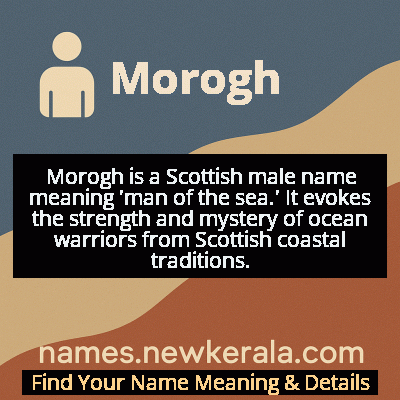Morogh Name Meaning & Details
Origin, Popularity, Numerology Analysis & Name Meaning of Morogh
Discover the origin, meaning, and cultural significance of the name MOROGH. Delve into its historical roots and explore the lasting impact it has had on communities and traditions.
Name
Morogh
Gender
Male
Origin
Scottish
Lucky Number
4
Meaning of the Name - Morogh
Morogh is a Scottish male name meaning 'man of the sea.' It evokes the strength and mystery of ocean warriors from Scottish coastal traditions.
Morogh - Complete Numerology Analysis
Your Numerology Number
Based on Pythagorean Numerology System
Ruling Planet
Uranus (Rahu)
Positive Nature
Strong sense of order, loyal, practical, and disciplined.
Negative Traits
Stubborn, overly serious, rigid, and prone to feeling restricted.
Lucky Colours
Blue, gray.
Lucky Days
Saturday.
Lucky Stones
Blue sapphire.
Harmony Numbers
1, 7, 8.
Best Suited Professions
Managers, engineers, accountants, organizers.
What People Like About You
Dependability, discipline, practicality.
Famous People Named Morogh
Morogh O'Brien
Gaelic Chieftain
Lord of Thomond who maintained Irish sovereignty against Norman expansion
Morogh MacDermot
Clan Chief
Leader of the MacDermot clan who defended traditional Gaelic territories
Morogh O'Flaherty
Naval Commander
Gaelic sea captain known for coastal defense and maritime expertise
Name Variations & International Equivalents
Click on blue names to explore their detailed meanings. Gray names with will be available soon.
Cultural & Historical Significance
Throughout medieval Scottish history, men named Morogh were frequently recorded as ship captains, coastal defenders, and leaders of island communities, embodying the resilience required to thrive in harsh maritime environments. The name's persistence through centuries speaks to its enduring cultural importance in Scottish coastal regions, where it represents not just individual identity but collective memory of maritime heritage and the enduring spirit of coastal peoples.
Extended Personality Analysis
Individuals named Morogh are typically characterized by a strong, independent nature combined with deep emotional currents. They often possess the calm exterior of still waters but can demonstrate formidable strength and determination when challenged, much like the sea they're named for. Their personality tends to reflect maritime qualities - adaptable yet persistent, mysterious yet reliable, with an innate understanding of timing and tides in both literal and metaphorical senses.
Moroghs are often drawn to exploration and discovery, whether physical journeys or intellectual pursuits, and they typically exhibit excellent problem-solving skills honed by the practical demands of their ancestral vocations. They tend to be loyal protectors of their communities while maintaining a certain solitary quality, comfortable with both leadership and introspection. This balance of social engagement and personal depth makes them valued friends and reliable partners in both personal and professional contexts.
Modern Usage & Popularity
In contemporary times, Morogh remains a relatively rare but culturally significant name, primarily used in Scotland and among Scottish diaspora communities. It has seen a modest resurgence as part of the broader Celtic naming revival movement, particularly among families with coastal or island heritage. The name maintains its strongest presence in the Scottish Highlands and Islands, where traditional Gaelic names are experiencing renewed interest. While not appearing on mainstream popularity charts, Morogh is valued for its distinctive sound and deep cultural roots, with modern parents choosing this name often seeking to honor Scottish heritage while selecting a name that stands out from more common alternatives.
Symbolic & Spiritual Meanings
Symbolically, Morogh represents the profound connection between humanity and the sea, embodying themes of depth, mystery, and enduring strength. The name carries connotations of navigation - both literal sea navigation and the metaphorical journey through life's challenges. It symbolizes adaptability and resilience, reflecting the sea's constant change while maintaining its fundamental nature, and serves as a bridge between practical seafaring traditions and the mystical qualities attributed to the ocean in Celtic culture, evoking the cyclical nature of tides that suggest patterns of retreat and advance in life.

